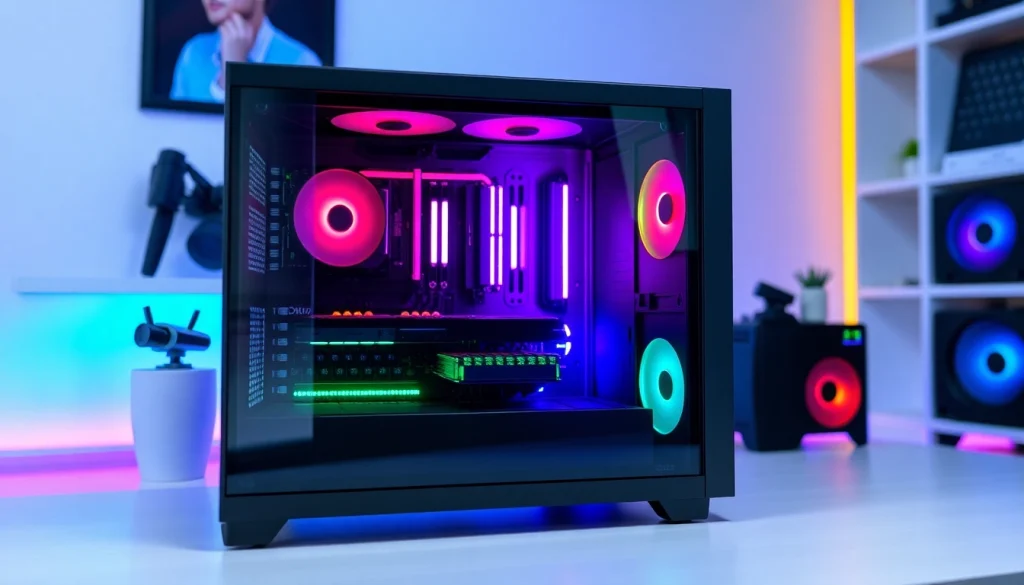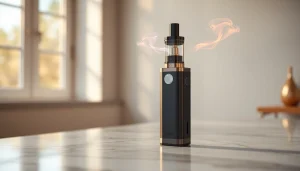
Understanding the Role of a PC CASE Manufacturer
The importance of a PC CASE Manufacturer in the hardware ecosystem cannot be overstated. These manufacturers produce protective enclosures for computer components, ensuring durability, functionality, and aesthetics. As gaming and high-performance computers have evolved, the selection and design of PC cases have become vital components that can impact the overall computing experience.
What is a PC Case and Its Importance?
At its core, a PC case serves as the physical chassis for a computer system. It houses critical components such as the motherboard, power supply, graphics card, and storage drives. The significance of a well-designed PC case goes beyond mere aesthetics; it affects airflow, cooling efficiency, component compatibility, and overall system performance. A high-quality PC case can prolong the lifespan of the components housed within, reducing the risk of overheating and mechanical failure.
Key Features of Innovative PC Cases
Today’s innovative PC cases are characterized by a variety of features that enhance usability and aesthetic appeal. Some of the key features include:
- Cooling systems: Modern cases come equipped with optimized airflow designs and support for liquid cooling solutions, allowing for better thermal management.
- Modular designs: Many manufacturers offer modular Internal layouts, allowing users to customize their builds according to personal preferences.
- Tempered glass panels: Aesthetic appeal has taken priority, with glass panels providing visibility to internal components, often illuminated with RGB lighting.
- Noise dampening: PC cases now frequently incorporate noise-reducing materials and designs to minimize operational sound, perfectly catering to gamers and professionals alike.
- Compatibility: Support for various motherboard sizes (ATX, mATX, Mini-ITX) and expansion possibilities are essential for custom builds.
Market Trends in PC Case Manufacturing
The PC case manufacturing market is expected to evolve continually with technological advancements. Key trends include:
- Rise of compact cases: As space-savvy computing rises, more users seek miniaturized PCs that do not sacrifice performance.
- Increased emphasis on customization: Demand for customizable features, including interchangeable panels and modular layouts, is on the rise.
- Sustainability efforts: Manufacturers are exploring eco-friendly materials and practices to appeal to environmentally conscious consumers.
- Integration of smart technology: An increasing trend toward integrating technology, such as IoT connectivity and built-in fans with active monitoring capabilities, is evident.
Types of PC Cases Offered by Manufacturers
Full Tower vs. Mid Tower Cases
Full tower and mid tower cases cater to different needs and preferences. Full tower cases provide ample space for high-end components, extensive cooling solutions, and multiple hard drive slots. They are ideal for enthusiasts who frequently upgrade or customize their setups. In contrast, mid tower cases strike a balance between size and functionality, often appealing to average users and gamers seeking ease of build while still offering adequate airflow and component compatibility.
Compact Cases for Unique Builds
As compact computing garners more popularity, compact cases designed for Mini-ITX and Micro-ATX motherboards have gained traction. These cases allow for space-efficient builds while still delivering performance and style. They are particularly popular among individuals who prioritize portability or have limited space, such as in urban living situations.
Specialty Cases for Custom Designs
Some manufacturers focus on producing specialty cases intended for unique applications. These can include cases designed for server use, cases that focus on liquid cooling compatibility, or even custom-made enclosures for aesthetic or thematic builds. The offering of specialty cases allows for a wide variance in hardware setups and user preferences.
Choosing the Right PC CASE Manufacturer
Top Brands to Consider in 2023
When selecting a manufacturer, several reputable brands stand out for their high-quality PC cases:
- Corsair: Noted for its functional designs and aesthetically pleasing cases.
- Lian Li: Known for their premium aluminum cases, often boasting innovative cooling solutions.
- Fractal Design: Recognized for its minimalistic designs with a focus on airflow optimization.
- NZXT: Popular for its sleek designs and RGB illuminated cases that appeal to gamers.
- Thermaltake: Offers a wide range of cases with customizable options and robust cooling solutions.
Key Factors in Manufacturer Selection
When deciding on a PC case manufacturer, one should consider the following factors:
- Reputation: Look for brands that have established themselves with a history of quality products and positive user reviews.
- Warranty: A solid warranty can often indicate the manufacturer’s confidence in their product’s durability.
- Customer support: Reliable customer support can be invaluable, especially if issues arise after purchase.
- Innovation: Manufacturers that frequently update their product lines to reflect market trends tend to offer better long-term value.
Comparative Analysis of Features and Prices
Analyzing prices relative to features is essential when choosing a suitable PC case. One must balance budget constraints with desired features. For instance, while a high-priced case might offer advanced cooling systems and premium aesthetics, a more moderately priced case might offer sufficient functionality for average gaming needs. User reviews and comparative analysis between competing products can offer insights into the overall value of a case.
Best Practices in PC Case Design and Functionality
Optimizing Airflow and Cooling Solutions
Airflow plays a critical role in maintaining the performance of a PC. An effective cooling solution can increase component longevity and overall system stability. Best practices in optimizing airflow include:
- Incorporating positive airflow with more intake fans than exhaust fans.
- Utilizing dust filters to minimize dust contamination in the case.
- Arranging cables neatly to avoid obstruction of airflow.
- Creating a balance between aesthetics and cooling efficiency for high-performance components.
Understanding Aesthetics vs. Functionality
While aesthetics are a significant consideration for many builders, it’s essential to find a balance between looks and functionality. A well-ventilated case that maximizes cooling potential can often look appealing, while overly ornate designs may impede airflow or create other issues.
Integration with Modern Gaming Components
As gaming components continue to evolve, PC cases must accommodate these advancements. Factors such as GPU size, liquid cooling solutions, and RGB lighting integration are paramount for modern builders. Selecting a PC case with ample space and necessary mounting points for these components enhances compatibility and ultimately yields a smoother building process.
Future Innovations in PC CASE Manufacturing
Eco-Friendly Materials and Sustainability Trends
As consumers become increasingly environmentally conscious, manufacturers are focusing on sustainable materials and production methods. Innovations include recycled metals and plastics in case construction as well as energy-efficient manufacturing processes. Such changes can lessen the overall environmental impact of gaming hardware while appealing to an eco-aware consumer base.
The Impact of RGB Lighting and Customization
RGB lighting has transformed how PC cases are perceived. Modern consumers expect customization options, such as adjustable RGB lighting. This feature not only enhances aesthetic appeal but also offers users the opportunity to personalize their setups, allowing for uniquely tailored systems that reflect individual preferences.
Smart Cases and Technology Integration
As technology advances, we see the rise of smart PC cases, which integrate IoT elements that allow for remote monitoring and management of internal temperatures and fan speeds. Some cases may allow users to control lighting or system performance on mobile apps, blending practical functionality with modern technology in ways that enhance the user experience.






